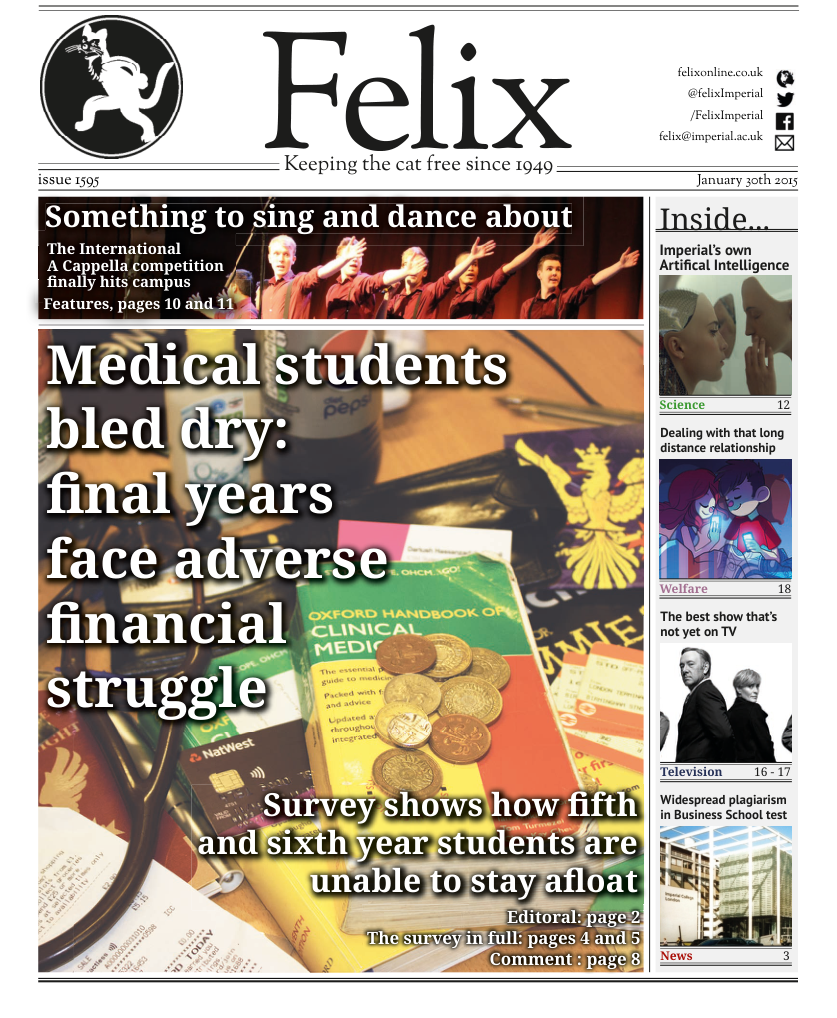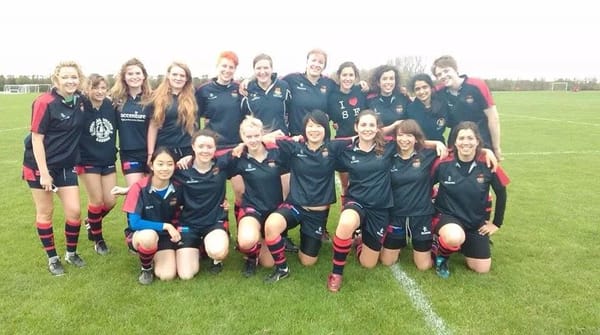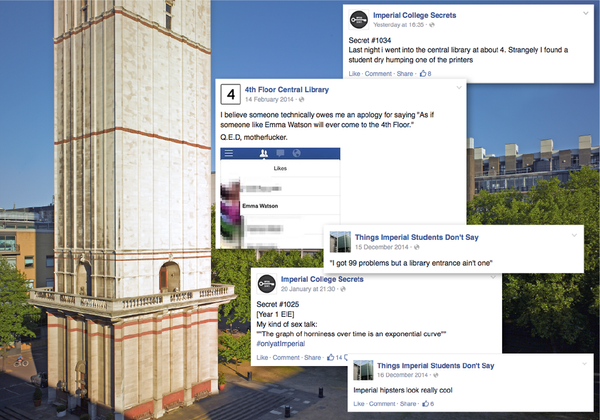Survey reveals damning truth about medics’ financial hardship
Philippa Skett investigates as ICSM survey says that 97% final year students are in the red

Recent survey results have shown that students in their final years of medicine face extreme financial difficulty, with one in two students saying that their financial situation might affect their ability to complete their degree.
A shocking 87% of students in their fifth and sixth year of medicine said they have financial concerns, and 50% of the respondents also said that the pressure may affect their physical or mental health. Only 3% of students are able to cover all their outgoings with the financial aid available, with those surveyed facing an average deficit of £141 a week that is covered by parental support or part time jobs.
Students in their clinical years (the final two years of their degree) see their maintenance loan from Student Finance slashed, and, despite being eligible for a NHS bursary, students are still struggling to make ends meet.
From the students surveyed, students are receiving on average around £2,000 from the NHS Bursary and another £2,000 from Student Finance each year, amounting to roughly £98 a week. However students are also seeing annual outgoings amounting to roughly £12,000 – putting many students seriously in the red.
The survey, run by Imperial College School of Medicine Student Union (ICSMSU), asked current students about their incomes and outgoings, and how they were coping with their finances. Over 100 students from the current fifth and sixth year of medicine responded. The survey was promoted in all-student emails, on various ICSMSU Facebook pages and on twitter.
Using the data from those who responded, students in these years are paying on average £141 a week on rent, £25 on travel, £40 on food and are spending around £33 on everything else.
However, fifth and sixth year students do not get as much financial aid as the lower years, leading to a greater deficit and more stress as a result. Matched with the academic demand of these clinical years, the lack of summer holiday available to work full time to save money, and the intense timetable that leaves little room for part time work, students are struggling more than ever.
Final years also have to arrange and undertake an Elective: a compulsory element of their degree, which often requires travelling abroad.
One respondent said: “Working at two part time jobs leaves me with little time to study. I manage to pass my exams each year but I don’t have the opportunity to put enough time into my studies to do any better.
“Two years ago I was diagnosed with depression and I believe a lot of it was to do with financial difficulties.”
Another said: “Constantly being worried about making ends meet is exhausting: I’m sick and tired of always thinking about it. Currently I tutor six times a week, but as a fifth year this is unacceptable and leaves me with little or no time to study myself... Even despite this, I am still constantly in the red.”
47% of students who responded to the survey have a part time job, work roughly nine hours a week and earn on average £12 an hour. However only 18% of students manage to remain in the black when balancing income, including bursaries, loans and wages and outgoings.
Said another respondent: “I am currently only able to continue with my studies thanks to savings I accrued from previous employment before and during the earlier years of medical school.
“Continuing with fifth year was only possible financially in thanks to a large extension of my overdraft, to around £2,000.”
Students currently in their clinical years, which are the final two years of medicine for Imperial students, aren’t eligible for a maintenance grant from Student Finance, and their maintenance loan is also significantly reduced too. Instead, they receive an NHS means tested bursary, which they do not have to pay back.
The maximum students can therefore claim in loans and bursary funding is £9,131 for those in fifth year, and £8,366 for sixth year students.
The NHS also pays their tuition fees for these final two years.
However, when comparing the survey results to Imperial’s own estimations for the cost of living, 92% of these medical students do not receive enough money through financial aid and part time work to cover Imperial’s predicted living cost.
Imperial estimates that students should expect to pay around £291 a week to cover rent, travel, leisure, academic-related and food costs. The weekly outgoing of the students surveyed was significantly lower than this: students are managing to live on an average of £237 a week (including rent), with many struggling to stay afloat.
An overview of the NHS bursary provision took place in 2012 when the tuition fees increased, although current fifth and sixth year students are still subject to the terms and conditions of the previous 2007 Scheme.
Those that started in 2012 or later may fare considerably better due to the introduction of a £1,000 grant that for which everyone, regardless of household income, is eligible. However, the maximum bursary students can receive will reduce by about £300.
The government loan also decreases further between the fifth and sixth year; current fifth year students will see the maximum loan available decrease by approximately £250 when they move into their final year this summer.
Most students have to turn to their parents for financial support to make up their financial shortfall. However, many students who replied to the survey also said they were uncomfortable doing this, or their parents were struggling to make ends meet too. Around 1 in 3 of those who responded said their parents were unwilling or unable to offer any sort of financial support.
Said one respondent: “I am completely reliable on my parents, who have other children to pay for and other expenses to worry about. I feel guilty about the increasing amount they need to provide for me.
“The loans available are incredibly low in a time where we pay for accommodation throughout the year, travel more/further and have an elective to organise.”
Said another: “My finances are a constant worry, to the extent that I very nearly took steps to take sabbatical years to save money by working full time on two occasions. I resent that I have become more of a burden on my parents as I have got older.”
It is not just the parents of medical students too who are struggling to cover the cost of their children’s education; a recent national survey ran by Experian, a global service information group, found that 1 in 10 students’ parents are borrowing or using credit cards to cover their children’s living expenses.
9% of the students who responded have already applied to the Faculty of Medicine’s own hardship fund for this academic year. Medical students can also apply to the College’s central student support fund too if needed.
Felix spoke to Dr Michael Schachter, a senior lecturer in the Faculty of Medicine, who also deals with students who are facing a financial struggle. Schachter told Felix how the Faculty of Medicine had already allocated over £25,000 from its own hardship fund to students in the past six months, typically allocating between £500 and £1000 depending on the needs of the student.
Said Schachter: “Since the summer, when year 5 and 6 of the medical course start, I have seen a massive increase in the number of students asking to see me because of severe financial difficulties, 300-400% more than the year before.
“This was totally unexpected but is clearly linked to the fact that the NHS bursaries are significantly less than students had received in the first 4 years of the course, but also less than most students had been anticipating: this is most apparent in fact from the transition from year 5 to 6.
“The sort of immediate problems I have been told about include not having money for the next month’s rent, having about £100 after rent for 3 months food and everything else, and working 30 hours a week in addition to a very intensive course effectively to survive.
“The really alarming thing is that even this worrying situation is likely to be an underestimate of the actual problem. Clearly unless something is done the same situation is likely to recur next year too.
“The School is working urgently with the College and ICMSU and ICU to avoid this or at least minimise its impact.”
The results of the survey were collected and analysed by Jennifer Watson, a fifth year medical student herself, and the current ICSMSU Welfare Officer.
Jennifer told Felix why she set the survey up in the first place: “I started looking into the situation after several of the welfare cases that came forward during the summer were related to financial worries.
“I was basically shocked by what I found. I admit, when I read through all the results, I cried a little going through the free text responses.”
ICSMSU President, Dariush Hassanzadeh-Baboli, spoke to Felix about how the survey’s findings may resonate with all medical students, not just those at Imperial. Said Dariush: “Jennie has put in a huge amount of effort into gathering this information. Clearly it is a big issue not only for ICSM students, but medical students nationwide.
“The lack of funding in the final two years of med school is very concerning, particularly as the work load increases dramatically and time to earn some extra cash dwindles significantly.
“We hope to see some rapid changes in the very near future.”
The survey is still open for people to fill in and have their say:









